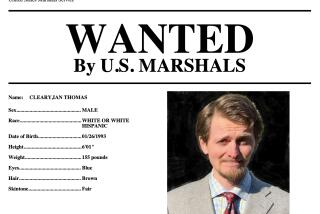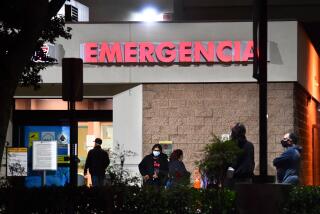Manhattan D.A. pledges $35M to end untested ‘rape kit’ backlog in U.S.
The Manhattan district attorney’s office has pledged up to $35 million in grant money to help end a nationwide backlog of untested “rape kits,” a move that could help uncover serial offenders after similar efforts led to a slew of convictions in Detroit.
New York County Dist. Atty. Cyrus Vance Jr. said Wednesday that his office will use funds seized through asset forfeiture laws, including recent cases where defendants were convicted of violating international sanctions, to support the reform effort.
“To have hundreds of thousands of rape kits untested is unacceptable. Rape victims nationwide deserve to know that the invasive examination they underwent had a purpose, and the resulting kit was not left to gather dust on a forgotten shelf,” Vance Jr. said at a news briefing. “But more than that, DNA evidence, consistently prosecutors’ most reliable and cost-effective tool, solves crimes across state lines.”
While Vance said law enforcement agencies in New York state will be given priority when applying for grants, he called on major cities across the country to request funds as well.
The Joyful Heart foundation, an advocacy group for sexual assault survivors founded by actress Mariska Hargitay, believes that hundreds of thousands of rape kits lie untested in police warehouses or evidence rooms throughout the country. The term rape kit refers to the collection of physical evidence recovered from a sexual assault victim shortly after the attack.
Sarah Tofte, vice president of policy and advocacy for the Joyful Heart foundation, told the Los Angeles Times that the donation from Vance’s office is “the largest single investment that any entity has made to end the rape kit backlog.”
“This grant or this gesture is meant to serve as a motivator or maybe a challenge to other policy makers or foundations or other stakeholders in this process to make a financial commitment to this work and to do what they can to contribute to it,” she said.
While there is no national database available to measure the amount of kits that remain untested throughout the country, several major cities have uncovered troves of unchecked evidence in recent years.
In 2009, the Wayne County prosecutor’s office in Michigan recovered more than 11,000 untested kits at an abandoned Detroit Police Department property room. Investigators uncovered more than 100 possible serial offenders after testing those kits, leading to 14 convictions.
Rick Bell, chief of the Cuyahoga County prosecutor’s special investigations division, told The Times that Cleveland-area law enforcement had similar success after deciding to test 4,400 kits that had been neglected between 1993 and 2010.
Following the approach used in Manhattan in the 1990s and Detroit in 2009, the mass testing has led to 220 indictments and 45 convictions, Bell said.
Speeding up testing of rape kits is crucial, Bell said, because delayed tests can also allow offenders to escape prosecution if the statute of limitations in a particular state runs out before a kit is brought to a lab for testing.
“It’s substandard police work to not do the DNA testing,” he said. “You have to test every rape kit and you have to swab every arrestee.”
But according to data compiled by Joyful Heart, 11,341 kits remain untested in Detroit. More than 12,000 untested kits have also been found in Memphis, Tenn., in recent years.
Still, Tofte said, there is no way to figure out how many kits remain untested nationwide without the help of local police departments.
“What we know about the backlog is still so much less than what we don’t know,” she said.
In California, legislators and police have taken steps to combat the problem.
In September, Gov. Jerry Brown signed into law a bill ordering police to submit all “rape kits” for forensic testing within 20 days of a reported attack.
The Los Angeles Police Department currently has no backlog, according to city records, and the department completed a major push to clear the department’s evidence logjam in 2011, testing nearly 6,000 evidence kits.
Other major cities in the region, however, have not been as successful. According to the data collected by Joyful Heart, Phoenix and Las Vegas alone have nearly 7,500 untested kits in their possession.
Hargitay, who plays Det. Olivia Benson on “Law & Order: Special Victims Unit,” founded Joyful Heart in 2004 while researching her role for the series, which focuses largely on sexual assault cases and domestic violence.
“To me, the rape kit backlog is one of the clearest and most shocking demonstrations of how we regard these crimes in our society,” Hargitay said on Wednesday. “Testing rape kits sends a fundamental and crucial message to victims of sexual violence: You matter. What happened to you matters. Your cases matter.”
Follow @JamesQueallyLAT for breaking news.
More to Read
Sign up for Essential California
The most important California stories and recommendations in your inbox every morning.
You may occasionally receive promotional content from the Los Angeles Times.











